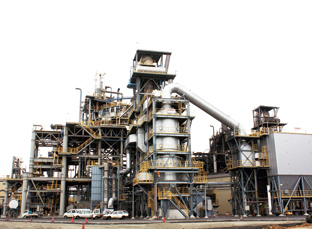
Nippon Steel and Kobe Steel announced on Monday their joint steel mill dust recycling plant started commercial operation in Hirohata works of Nippon Steel on October 1 after the construction work since May 2010. The plant will reach full capacity operation at monthly 12,000 tonnes or annual 150,000 tonnes of direct reduced iron in January 2012 while the operation rate is around 60% for the ramp up process.
They decided the joint venture in October 2008 as a part of options for further cooperation. They established the joint venture, Nittetsu Shinko Metal Refine, of which Nippon Steel controls 70% with 30% share by Kobe Steel, with 900 million yen of capital in Hirohata works. The joint venture built the plant including rotary hearth furnace and hot briquette machine with around 220,000 tonnes per year of treatment capacity for around 10 billion yen. The joint venture makes direct reduced iron and recovers zinc from steel mill dust. The parent companies use the direct reduced iron as substitutes of purchased ferrous scrap and iron ore and purchased zinc ore while the recycling contributes to zero emission effort. The joint venture uses steel mill dust at monthly 10,000 tonnes from Nippon Steel, 5,000 tonnes from Kobe Steel and 1,000 tonnes from Sanyo Special Steel when the plant operates at full capacity. The joint venture makes monthly 12,000 tonnes of direct reduced iron to provide 10,000 tonnes for Nippon Steel and Sanyo Special Steel and 2,000 tonnes for Kobe Steel. The parent companies mix Kobe Steel’s facility technology and Nippon Steel’s operation technology for the recycling to improve the dust recycling. Nippon Steel improves the dust recycling by the group operations in western Japan based on 3 facilities for dust recycling and direct reduced iron making facility in Hirohata. The system uses monthly 6,000 tonnes or annual 70,000 tonnes of dust from Sumitomo Metal Industries’ Wakayama works, Sumitomo Metals (Kokura) and Nisshin Steel’s Kure works.











